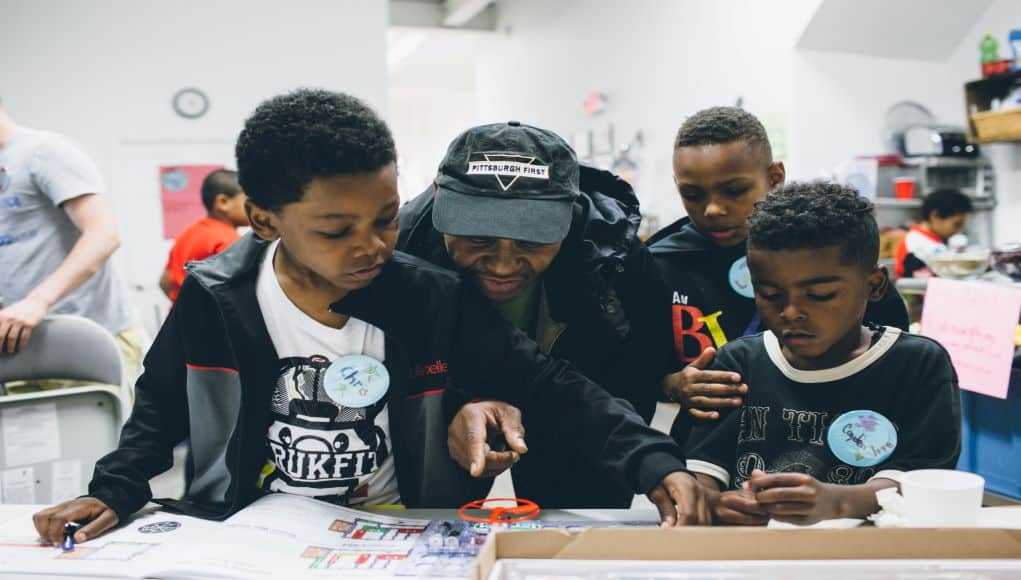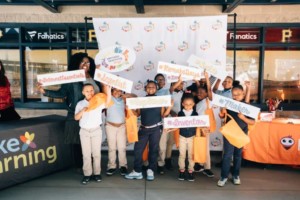From the Neighborhood to the Nation: Remake Learning Days Takes Root Across America

Sixty-six years ago, a world-famous physician named Benjamin Spock opened a nursery school in Pittsburgh. At the time, Spock was the rock star of pediatrics, thanks to his bestselling child-rearing tome, The Common Sense Book of Baby and Child Care. His purpose in opening the school was to study the arc of children’s growth and development and hopefully spark new insights into how learning happens.
It was a groundbreaking idea, and the school attracted the field’s top minds. The Arsenal Family & Children’s Center became a training ground for countless physicians, psychologists, and educators, and the research they conducted revolutionized their understanding of what teaching and learning could look like.
But perhaps the most remarkable aspect of the center was that the lessons learned there spread well beyond the school’s walls, traveling even beyond Pittsburgh to reach families across America. For that, we’re indebted to one person in particular: a young child-development student who trained at Arsenal for years.
His name was Fred Rogers.
Best known as the creator and host of Mister Rogers’ Neighborhood, Rogers was also an accomplished scholar. Taking what he learned at Arsenal and presenting it through a new technology called television, Rogers made the science of child development accessible, useful, and even entertaining to families. Everything about the Neighborhood — from its songs and stories to its puppets and props — was designed to support learning, and it quickly became one of the most enduring and beloved children’s programs of all time.
Though the Neighborhood’s final episode aired in 2001, our understanding of how learning happens has only continued to accelerate, with scientists in Pittsburgh and around the world unlocking the mysteries of the human brain. This knowledge, combined with the tireless efforts of educators, means today’s students are learning a lot differently than their parents did, both in and out of school. They’re coding software, filming documentaries, standing up for the environment, and even redrawing congressional maps.
Clearly, things have changed for today’s young people. But where does that leave their parents?
For those of us who grew up in so-called “traditional classrooms” — where desks stood in tidy rows, the only movement was a raised hand, and the walk home involved yet another uphill climb — it can sometimes seem hard to relate. The answers we get to that age-old question, What did you do at school today?, can range from compelling to incomprehensible, depending on what kinds of tools our children accessed that day. No wonder researchers note disconnects between parents’ perceptions of learning and the realities on the ground — the nonprofit Learning Heroes, for example, found that two-thirds of parents think their child is academically above average, even though fewer than two in five kids actually perform at grade level.
All of this raises an important question for educators: When it comes to promoting the future of teaching and learning, how do we bring parents into the fold in engaging, inclusive, joyful ways? How can we do what Rogers did and show families across America what learning, at its best, can look like?
That’s a question we’ve been asking here in Pittsburgh for more than a decade. And now, thanks in large part to the efforts of Remake Learning — an international network of more than 500 schools, libraries, museums, and others — we’re closer than ever to finding an answer.
Formed in 2007, Remake Learning’s network includes universities, technology firms, and school districts of all sizes and demographics coming together to ignite engaging, relevant, and equitable learning opportunities for every student. Within the network, a community robotics center partners with teachers and child-development experts to build a classroom app. A group of hip-hop artists partners with an afterschool provider to host teen poetry workshops. School districts team up to design professional learning experiences. The list goes on and on, making Pittsburgh a place where kids can find incredible learning opportunities wherever they are — whether in schools, libraries, parks, or less-traditional spaces like laundromats or doctor’s offices.
Though the results have turned heads everywhere from the Stanford Social Innovation Review to the World Economic Forum, Remake Learning has long recognized that without families, the network’s efforts cannot be maximized, sustained, or equitable. They play a crucial role in learning: From the ways they talk about and engage in learning opportunities, to the expectations they hold for children, to the kinds of experiences they can access and advocate for, parents and caregivers matter.
That’s why, in 2016, we launched the first-ever Remake Learning Days, the world’s largest open house for the future of teaching and learning. Comprised of several hundred events taking place over several days, the festival lets kids and their families learn alongside one another in exciting, hands-on settings. In an old theater, for example, they might build robotic replicas of their favorite movie characters. Or they might learn how to spot invasive plants and turn them into paper. Whether focused on making, the arts, outdoor learning, or one of several other themes, each event does what Rogers himself did: They bring the latest in teaching and learning directly to families, allowing them to experience it in their own neighborhoods and on their own terms, with an emphasis on equity, discovery, and delight.
After drawing more than 30,000 families in its first year, Remake Learning Days has become the region’s flagship annual learning event. Recently, the Global Family Research Project evaluated the festival’s impact, and the findings were clear: Families who attend Remake Learning Days develop a deeper understanding of what learning can look like in the digital age. They report strengthened child-parent relationships. And best of all, many become champions for modern learning, reporting a renewed commitment to — and pride in — their community organizations and schools.
The cumulative effect of all this is perhaps best expressed by Alex Lackner, the local parent at the end of this video:
“Do we have these robots at home? No. Are we aware of all the educational tools that are being used today? No . . . [but] when you’re here, you say, ‘Oh, gosh. Yeah, we have to do more of this.’”
Reactions like Lackner’s are one reason why this spring, Remake Learning Days is taking root in places beyond greater Pittsburgh for the first time. Beginning in April and continuing through May, Remake Learning Days Across America will launch in seven additional cities and regions, from Chicago to the mid-Atlantic to Appalachia and points further south. Coordinated in partnership with PBS Kids and Digital Promise, and supported by the Carnegie Corporation of New York, Schmidt Futures, and The Grable Foundation, these festivals of learning will engage tens of thousands of families, helping parents develop their own insights into how learning happens and showing them firsthand the tools, environments, and resources available to today’s young people.
And you’re invited. Whether you’re a teacher, an afterschool provider, an artist, or simply a caring adult with a passion for learning, come see for yourself what happens when families immerse themselves in the best of what education has to offer. Together, we’ll bring the future of teaching and learning directly to parents and caregivers, building a nation of advocates who can look for, develop, and demand the learning opportunities that their children and communities deserve.
Remake Learning Days Across America:
- Eastern Kentucky: April 13-20
- Knoxville, Tennessee: April 15-20
- Southwestern Pennsylvania and West Virginia: May 9-19
- Chattanooga, Tennessee: May 11-18
- Southeastern Pennsylvania: May 15-24
- Chicago, Illinois: May 16-19
- North Carolina Research Triangle: May 17-18
- Northeast Ohio: May 17-29
For more, see:
- Getting Smart on Reinventing Education: How a Pittsburgh Network is Remaking Learning
- Getting Smart Podcast | A Human Network to Remake Learning in Pittsburgh
- Integrated Learning Propels Pittsburgh Students
Gregg Behr is the co-chair of Remake Learning and executive director of The Grable Foundation. Follow him on Twitter @GreggBehr
Stay in-the-know with innovations in learning by signing up for the weekly Smart Update.





0 Comments
Leave a Comment
Your email address will not be published. All fields are required.